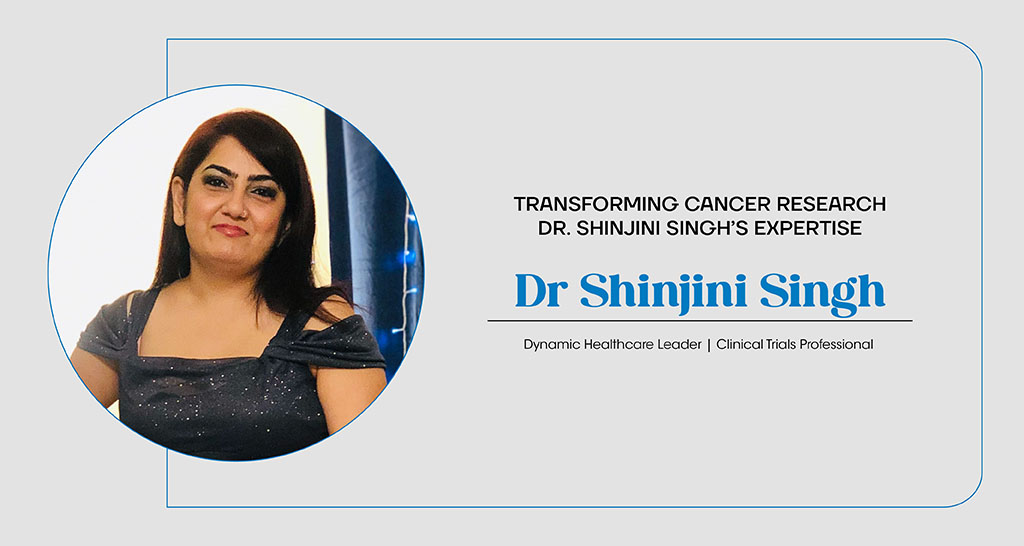Dr. Shinjini Singh is a dynamic healthcare leader revolutionizing cancer care through her work in clinical trials. As the Clinical Trials Professional at the Taussig Cancer Institute, Cleveland clinic, she leverages the power of research and dedication to bring cutting-edge research and medicines to patients. With her vast experience and passion for innovation, Dr. Shinjini emphasizes the importance of representation in clinical trials, paving the way for more inclusive and effective cancer care.
The Early Beginnings of the Visionary Leader
Born in Gorakhpur, UP, Dr. Shinjini belongs to a highly educated family. Her father, Dr. O. P. Singh, was a professor and Head of the Department of Anesthesiology and Dean at BRD Medical College. Growing up on a medical college campus, she developed a strong foundation in academics and sports. She excelled in school, being an all-around student, lead singer, best athlete, and head girl.
Dr. Shinjini pursued her master’s in biotechnology and later earned her PhD from Banaras Hindu University (BHU). Her PhD journey was supported by her mentor, Prof. R. K. Singh. She got married to her childhood friend, Anuj Srivastava, and later moved to the US, where she continued her career in cancer research.
Dr. Shinjini’s Journey in Cancer Research
Dr. Shinjini’s interest in cancer research began during her PhD work on breast cancer patients in the Northeastern part of India. The prevalence of disease in the population Dr. Shinjini’s interest in cancer research began during her PhD work on breast cancer patients in the Northeastern part of India. The prevalence of disease in the population was insane, and she was surprised that most of the patients belonged to rural parts of India, where women are neglected and they neglect their health issues themselves. Her research led to the discovery of novel mutations, which were patented and submitted to the World Gene Bank. Later, she worked at the University of Texas MD Anderson Cancer Center, exploring the anti cancer role of natural agents like curcumin. Her passion for clinical trials grew while working at Seidman Cancer Center, driven by the potential to bring cutting-edge research and medications to patients worldwide.
Finding Motivation in Oncology
Dr. Shinjini’s experience working with dementia and breast cancer patients has shaped her perspectives and fueled her passion for making a difference. Although hard at the beginning, her work with patients and their families taught her empathy and resilience. Now, she finds motivation in knowing she is positively impacting lives and making a difference in the world. Her work gives her life purpose and meaning.
The Latest Advancements in Oncology Research
Dr. Shinjini is excited about the current direction of oncology research, mainly the exploration of the tumor ecosystem and its impact on cancer development and treatment. She highlights the importance of understanding the intricate relationships between tumor cells, immune cells, and other components, as well as the role of innovative technologies in driving breakthroughs. The shift of knowledge from bench to bedside and back is crucial for future research and enhancing patient outcomes.
Evolution of Cancer Care
Dr. Shinjini notes that cancer care has evolved remarkably over the years, from traditional Ayurvedic medicine to modern targeted therapies. In ancient Indian medicine, people used to use natural agents like turmeric, which has a multi-targeted approach. Modern medicine has advanced to DNA sequencing and cytogenetics, allowing targeted immunotherapies such as CAR-T cell therapy that mainly treat the T cells to find and fight against cancer cells. These innovative technologies provide promising treatments for different cancers.
Staying Updated in a Rapidly Evolving Realm
Dr. Shinjini attributed her growth to her intense passion for research, which drives her to continuously read, learn, and stay updated on the latest knowledge. Also, her involvement in cutting-edge cancer clinical trials and staying informed about FDA guidelines and updates from organizations like SOCRA enables her to stay compliant and current in her field.
Fostering Interdisciplinary Collaboration in Clinical Research
Dr. Shinjini focuses on the importance of interactions between basic scientists and clinicians to drive critical developments in cancer treatment. She suggests that increased interdisciplinary discussions and networking opportunities can lead to better treatments. By bridging the gap between benchside scientists and bedside clinicians, healthcare organizations can facilitate the transition of scientific findings into real-world applications, ultimately enhancing patient outcomes.
Reduce Cancer Risk through Lifestyle Choices
Dr. Shinjini focuses on the importance of exercise, like yoga, and breathing techniques like pranayama in reducing cancer risks. She also recommends including a few minutes of mindful meditation in their daily routines. A balanced anti-inflammatory diet rich in fruits, vegetables, and greens, with reduced red meat consumption, can lower the risk of cancer and other lifestyle diseases.
Debunking the “Sugar High” Myth
Dr. Shinjini wants to debunk the common myth that sugar causes hyperactivity or behavioral and cognitive changes in kids, known as a sugar high. Scientific evidence has proved that sugar does not lead to any such changes.
The Future of Cancer Detection and Treatment
Dr. Shinjini believes that a single blood test for detecting multiple deadly cancers will become mainstream in the next 5-10 years. With ongoing trials and significant investment in oncology research, advancements in therapies like small molecules, antibody-drug conjugates, and immuno-oncology biologics are expected. These innovations, including bispecific antibodies, will transform cancer treatment, offering new hope for patients with breast, genitourinary, hematologic, and thoracic cancers.
The Evolving Role of AI and Big Data
Dr. Shinjini believes AI and big data are revolutionizing clinical trials and cancer care. With cloud-based platforms like Veeva Vault, clinical trials are becoming more efficient but require flexibility, scalability, and user friendly interfaces. AI is significantly impacting cancer prevention, detection, and treatment of cancer. What challenges, like ethics and data privacy, remain? AI is paving the way for a promising future in cancer research and care.
Ensuring Diverse and Inclusive Clinical Trials
Dr. Shinjini emphasizes the importance of research institutions enrolling diverse populations in clinical trials, including various ethnicities and races. This ensures that trials are unbiased and treatments are effective for all segments of society. By including diverse gene pools, institutions can develop treatments that cater to the needs of different populations, such as white Americans, Hispanic and Latino Americans, African Americans, and Native Americans.
Future Roadmap
Looking ahead, Dr. Shinjini aims to continue learning, growing, and gaining expertise in clinical research, striving to become a remarkable leader, innovator, and influencer in her field. She believes she is guided by a higher purpose, with the blessings of her loved ones who have passed away, her father and father-in-law. Her ultimate objective is to keep supporting patients and their families, creating a positive impact in the world.






